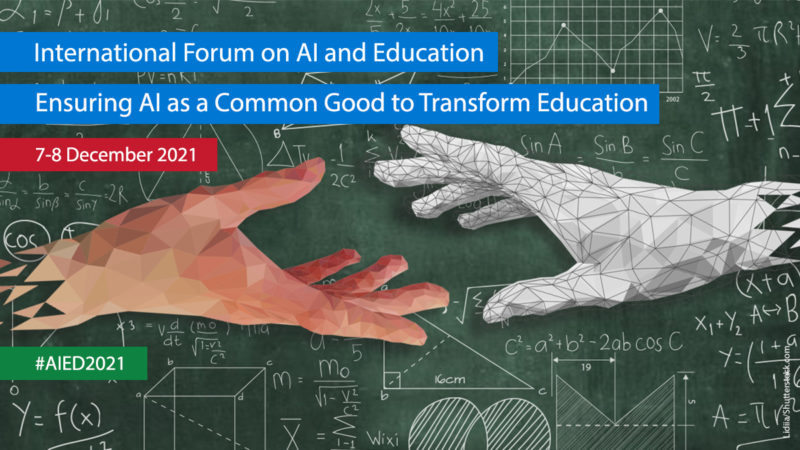Today, technological innovations bring key opportunities for humans to address the global crisis by transforming our lives and changing the current course of the development of human societies. The development of Artificial Intelligence (AI) is part and parcel of the digital transformation of all facets of our societies – from our daily lives to the world of work and to public services, including education.
With this committed concept, the International Forum on AI and Education. Ensuring AI as a
Common Good to Transform Education led the world education community through its meaningful and insightful events of 7-8 December 2021.
The overarching goal of the international endeavor was to deliberate on how AI governance and
AI innovation networks could be enhanced to direct AI at the common good for education and
for humanity.
The event provided a platform for discussions around five sub-themes:
-
- global governance and national policies on AI in education;
- ensuring AI as a common good for achieving SDG 4;
- mining data to enhance education management and learning assessment;
- directing AI innovations at inclusion, equity and gender equality in education;
- promoting the use of AI in Africa: building the partnership.
UNESCO IITE ensured its wholesome support and contribution to the Forum’s third Session: the High-level panel on mining data to enhance education management and learning assessment, through conducive and responsive moderation by Ms Natalia Amelina, IITE’s Senior National Project Officer in Education, Chief of Unit of Teacher Professional Development and Networking, and the encouraging concluding speech by Mr Tao Zhan, Director of the UNESCO Institute for Information Technologies in Education.
The Session’s focus was to examine the emerging practices of mining data across platforms or multiple data sources to enhance education management and public service, assess lifelong learning outcomes, and diagnose the major problems of learning systems; assess the limitation in using data and AI to support learning assessment and ethical issues relating to the use of data and AI tools to predict human behaviours including data privacy and security, and algorithm biases.
The high-profile session was marked by eloquent and enlightening speeches, reports, and presentations from nine dignitaries – renowned experts representing different world regions, countries,
and organizations:
-
- Ms Gabriela Ramos, Assistant Director-General for Social and Human Sciences, UNESCO;
- H.E. Mr Rustam Karimjonov, Deputy Minister of the Public Education, Uzbekistan;
- Dr Khalid Abdulla Al-Ali, Undersecretary Assistant for Higher Education Affairs, Ministry of Education and Higher Education, Qatar;
- Mr Ir Nizam, Director-General for Higher Education, Ministry of Education, Culture, Research and Technology, Indonesia;
- Mr ZHENG Qinghua, Vice-President, Xi’an Jiaotong University, China;
- Mr Shahbaz Khan, Director of UNESCO Beijing Office, UNESCO;
- Mr Mikko-Jussi Laakso, Director, Centre for Learning Analytics, University of Turku, Finland;
- Ms Christothea Herodotou, Associate Professor, Open University, United Kingdom;
- Ms Toyosi Akerele-Ogunsiji, Social Entrepreneur in Data Science and Artificial Intelligence Education, Nigeria.
The high-level panel within Session 3 featured over 340 participants, while in general, the events of the two-day International Forum gathered 1,763 viewers, attendees, and contributors from more than
100 countries worldwide.

